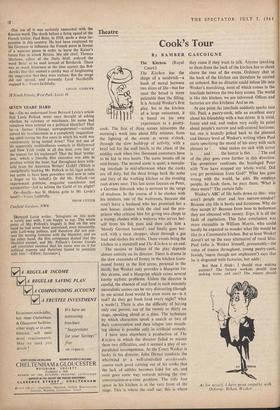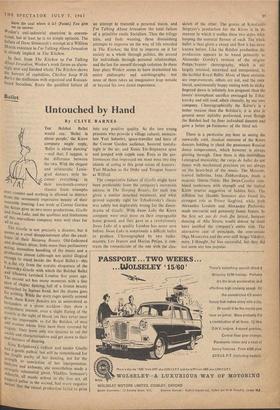Theatre
Cook's Tour
By BA MBER GASCOIGNE The Kitchen has the shape of a sandwich—a hunk of moral between two slices of life--but for once the bread is more palatable than the filling.
1 4, It is Arnold Wesker's first ig play. Set in the kitchen 1'1 I ;) of a large restaurant, it is based on nis own experiences as a pastry- cook. The first of three scenes telescopes the morning's work into about fifty minutes, from the lighting of the ovens at seven o'clock, through the slow build-up of activity, with a brief lull for the staff lunch, to the chaos of the midday rush when two thousand customers have to be fed in two hours. The scene breaks off in mid-frenzy. The second scene is quiet, a moralis- ing interlude in mid-afternoon when the cooks are off duty, but the third brings back the noise and fury of the working kitchen as the evening rush draws near. This last scene focuses on Peter, a German fish-cook who is nervous to the verge of madness. In the course of it he clashes with his mistress, one of the waitresses, because she won't leave a husband who has promised her a new house; clashes with the chef and the pro- prietor who criticise him for giving two chops to a tramp; clashes with a waitress who serves her- self from his fish pans and then calls him a 'bloody German bastard'; and finally goes ber- serk with a meat chopper, slices through a gas lead and slashes his wrists. These events bring the kitchen to a standstill and The Kitchen to an end.
The success or failure of the play depends almost entirely on its director. There is drama in the slow crescendo of frenzy in the kitchen (com- munal frenzy in the first scene, personal in the third), but Wesker only provides a blueprint for this drama, and a blueprint which raises several knotty stylistic problems. Unless the director is careful, the absence of real food in such minutely naturalistic scenes can be very distracting (though to use actual food would be even more so—is it real? do they get fresh food every night? what a waste!). There is also the difficulty of having only one person, out of the twenty or thirty on stage, speaking aloud at a time. The technique by which characters speak a snatch or two of their conversation and then relapse into mouth- ing silence is possible only in artificial comedy.
I have seen elsewhere a production of The Kitchen in which the director failed to master these two difficulties, and it seemed a play of un- paralleled incompetence. At the Court Wesker is lucky in his director. John Dexter conducts the whirlwind ir a well-controlled accelerando, coaxes such good roiming out of his cooks that the lack of edibles becomes food for art, and even goes some way towards solving the one- conversation-at-a-time problem. The only free space in his kitchen is at the very front of the stage. This is where the staff eat; this is where they come if they want to talk. Anyone speaking to them from the back of the kitchen has to shout above the roar of the ovens. Ordinary chat at the back of the kitchen can therefore be carried on unheard. But no director could infuse life into Wesker's moralising, most of which comes in the interlude between the two busy scenes. The world is like this kitchen, we are informed. Offices and factories are also kitchens. And so on.
At one point the interlude suddenly sparks into life. Paul, a pastry-cook, tells an excellent story about his friendship with a bus driver. It is vivid, funny and sad, and makes very easily its point about people's narrow and self-centred horizons; but one is brutally jerked back to the planned and literary level of Wesker's writing when Paul starts specifying the moral of his story with such phrases as '. . what makes me sick with terror is . . .' and . . the horror is this . . .' The end of the play goes even further in this direction. The proprietor confronts the bandaged Peter with 'You have stopped my whole world. Did you get permission from God?' What has gone wrong with the world, he asks. He employs people, he feeds them, he pays them. 'What is there more?' The curtain falls.
Wesker's ABC of life boils down to this : why aren't people nicer and less narrow-minded? Because city life is hectic and ferocious. Why do they accept it? Because from boss to boilerman they are obsessed with money. Ergo, it is all the fault of capitalism. This false conclusion was more excusable in William Morris, who could hardly be expected to wonder what life would be like in a Communist kitchen. But at least Wesker doesn't set up the easy alternative of rural bliss. Paul (who is Wesker himself, presumably—the voice of reason throughout, young pastry-cook, Jewish, 'suave though not unpleasant') says that he is disgusted with factories, but adds:
But then I think: l should stop making pastries? The factory workers should stop making trains and cars? The miners should
AA for MyAC/f, / have great empathy with Osborne, Behan, W esker. . . . leave the coal where it is? (Pause.) You give me an answer.
Wesker's anti-industrial obsession is conven- tional, but at least he is no simple optimist. The failure of Dave Simmonds's attempt at a William Morris existence in I'm Talking About Jerusalem Is already implicit in The Kitchen.
In fact, from The Kitchen to I'm Talking About Jerusalem, Wesker's work forms an alarm- IVY neat and finished whole. The Kitchen shows the horrors of capitalism, Chicken Soup With Barley the disillusion with organised and Russian- based Socialism, Roots the qualified failure of an attempt to transmit a personal vision, and I'm Talking About Jerusalem the total failure of a primitive rustic Socialism. Thus the trilogy tries, and finds wanting, three diminishing attempts to improve on the way of life revealed in The Kitchen; the first to improve on it for society as a whole through politics, the second for individuals through personal relationships, and the last for oneself through isolation. In these four plays Wesker seems to have dramatised his entire philosophy and autobiography, but none of them takes an imaginative leap outside or beyond his own direct experience.



























































 Previous page
Previous page